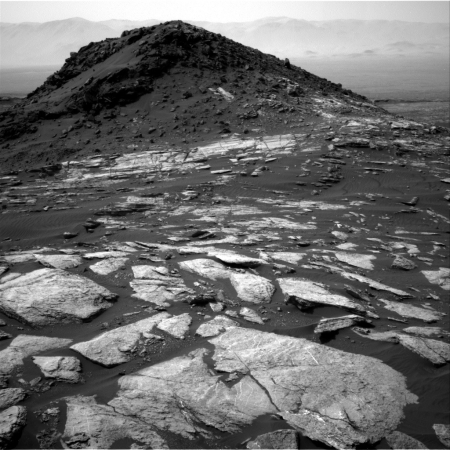Curiosity’s drill remains out of commission

In a science update on Curiosity’s research in Gale Crater, this Science journal article today gives a good overall update on Curiosity’s technical condition.
Since early December 2016, Curiosity hasn’t been able to drill. The problem, likely a stuck brake on the mechanism for extending the drill bit, is serious. “There is apprehension,” says Ashwin Vasavada, Curiosity’s project scientist at the Jet Propulsion Laboratory in Pasadena, California. But the drill still responds intermittently. “We’re not in a situation where it’s completely dead.”
Still, the clock is ticking for the aging rover, and some outside scientists regret not having used a wet chemistry cup. Rocks have punctured its wheels, and the output of its decaying radioactive power source has dropped by 15%. Jack Mustard, a planetary scientist at Brown University, says he understands the team’s hesitancy. But he wished the “mission had moved more quickly with the wet chemistry experiments,” he says. “I am eager to see what we can learn.”
The wet chemistry cup, designed to look for organic life, is an experiment that requires use of the drill but the science team has held off doing. Now it might be too late.
At the moment Curiosity is approaching [see Sol 1598-1599] the small hill that had been to its southwest in my January 18, 2017 update and shown in the image above. I had thought they might make a side trip there on their way up Mount Sharp, and they have, with their actual route taking them around the backside of the hill.
On Christmas Eve 1968 three Americans became the first humans to visit another world. What they did to celebrate was unexpected and profound, and will be remembered throughout all human history. Genesis: the Story of Apollo 8, Robert Zimmerman's classic history of humanity's first journey to another world, tells that story, and it is now available as both an ebook and an audiobook, both with a foreword by Valerie Anders and a new introduction by Robert Zimmerman.
The print edition can be purchased at Amazon or from any other book seller. If you want an autographed copy the price is $60 for the hardback and $45 for the paperback, plus $8 shipping for each. Go here for purchasing details. The ebook is available everywhere for $5.99 (before discount) at amazon, or direct from my ebook publisher, ebookit. If you buy it from ebookit you don't support the big tech companies and the author gets a bigger cut much sooner.
The audiobook is also available at all these vendors, and is also free with a 30-day trial membership to Audible.
"Not simply about one mission, [Genesis] is also the history of America's quest for the moon... Zimmerman has done a masterful job of tying disparate events together into a solid account of one of America's greatest human triumphs."--San Antonio Express-News

In a science update on Curiosity’s research in Gale Crater, this Science journal article today gives a good overall update on Curiosity’s technical condition.
Since early December 2016, Curiosity hasn’t been able to drill. The problem, likely a stuck brake on the mechanism for extending the drill bit, is serious. “There is apprehension,” says Ashwin Vasavada, Curiosity’s project scientist at the Jet Propulsion Laboratory in Pasadena, California. But the drill still responds intermittently. “We’re not in a situation where it’s completely dead.”
Still, the clock is ticking for the aging rover, and some outside scientists regret not having used a wet chemistry cup. Rocks have punctured its wheels, and the output of its decaying radioactive power source has dropped by 15%. Jack Mustard, a planetary scientist at Brown University, says he understands the team’s hesitancy. But he wished the “mission had moved more quickly with the wet chemistry experiments,” he says. “I am eager to see what we can learn.”
The wet chemistry cup, designed to look for organic life, is an experiment that requires use of the drill but the science team has held off doing. Now it might be too late.
At the moment Curiosity is approaching [see Sol 1598-1599] the small hill that had been to its southwest in my January 18, 2017 update and shown in the image above. I had thought they might make a side trip there on their way up Mount Sharp, and they have, with their actual route taking them around the backside of the hill.
On Christmas Eve 1968 three Americans became the first humans to visit another world. What they did to celebrate was unexpected and profound, and will be remembered throughout all human history. Genesis: the Story of Apollo 8, Robert Zimmerman's classic history of humanity's first journey to another world, tells that story, and it is now available as both an ebook and an audiobook, both with a foreword by Valerie Anders and a new introduction by Robert Zimmerman.
The print edition can be purchased at Amazon or from any other book seller. If you want an autographed copy the price is $60 for the hardback and $45 for the paperback, plus $8 shipping for each. Go here for purchasing details. The ebook is available everywhere for $5.99 (before discount) at amazon, or direct from my ebook publisher, ebookit. If you buy it from ebookit you don't support the big tech companies and the author gets a bigger cut much sooner.
The audiobook is also available at all these vendors, and is also free with a 30-day trial membership to Audible.
"Not simply about one mission, [Genesis] is also the history of America's quest for the moon... Zimmerman has done a masterful job of tying disparate events together into a solid account of one of America's greatest human triumphs."--San Antonio Express-News


Looking at that picture I wonder what is its geological history and what minerals might we find? Robots are very limited in what they can tell us.